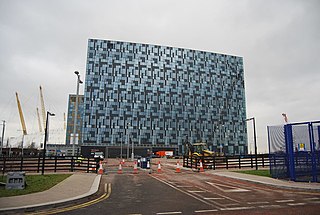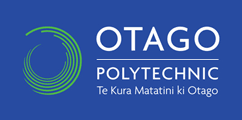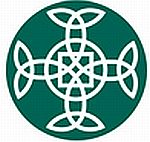The education system in New Zealand implements a three-tier model which includes primary and intermediate schools, followed by secondary schools and by tertiary education at universities and polytechnics. The academic year in New Zealand varies between institutions, but generally runs from early February until mid-December for primary schools, late January to late November or early December for secondary schools and polytechnics, and from late February until mid-November for universities.
Gifted education is a sort of education used for children who have been identified as gifted and talented.
Special education is the practice of educating students in a way that accommodates their individual differences, disabilities, and special needs. This involves the individually planned and systematically monitored arrangement of teaching procedures, adapted equipment and materials, and accessible settings. These interventions are designed to help individuals with special needs achieve a higher level of personal self-sufficiency and success in school and in their community, which may not be available if the student were only given access to a typical classroom education.

New Zealand Sign Language or NZSL is the main language of the deaf community in New Zealand. It became an official language of New Zealand in April 2006 under the New Zealand Sign Language Act 2006. The purpose of the act was to create rights and obligations in the use of NZSL throughout the legal system and to ensure that the Deaf community had the same access to government information and services as everybody else. According to the 2013 Census, over 20,000 New Zealanders know NZSL.

Van Asch Deaf Education Centre was located in Truro Street, Sumner, Christchurch, New Zealand. It was a special school for deaf children, accepting both day and residential pupils, as well being as a resource centre providing services and support for parents, mainstream students and their teachers in the South Island and the Lower North Island.

Mount Roskill Grammar School is a secondary school in the suburb of Mount Roskill, Auckland. Officially opened in 1953, the school is widely regarded as one of the most diverse schools in Auckland, having students of over 70 different nationalities including approximately 120 International students. The school has been noted by media for its rising academic success and exceptional performance for its low socio-economic decile.

St Paul's Collegiate School is a private (independent) Anglican secondary school in Hamilton, New Zealand. Opened in 1959 originally as a boys only school, the school began admitting girls in years 12 to 13 in 1985, then girls in years 11 to 13 in 2010.
Toko School is a full co-educational primary school located in Stratford, New Zealand which was established in 1893. Toko School was opened in 1893 and was little more than a room above a milking shed. The school was soon properly established on its current site 2 kilometers past the township of Toko.
Educational stages are subdivisions of formal learning, typically covering early childhood education, primary education, secondary education and tertiary education. The United Nations Educational, Scientific and Cultural Organization (UNESCO) recognizes nine levels of education in its International Standard Classification of Education (ISCED) system. UNESCO's International Bureau of Education maintains a database of country-specific education systems and their stages. Some countries divide levels of study into grades or forms for school children in the same year.

Teach First is a social enterprise registered as a charity which aims to address educational disadvantage in England and Wales. Teach First coordinates an employment-based teaching training programme whereby participants achieve Qualified Teacher Status through the participation in a two-year training programme that involves the completion of a PGDE along with wider leadership skills training and an optional master's degree.

Otago Polytechnic was a public New Zealand tertiary education institute, centred in Dunedin with additional campuses in Cromwell and Auckland. Otago Polytechnic provided career-focused education and training, offering a range of New Zealand accredited postgraduate qualifications, degrees, diplomas and certificates at levels 2–10. In November 2022, it was formally merged into the new national mega polytechnic Te Pūkenga, ending its existence as an independent entity.

Public education—from primary education through college—is open to every Saudi citizen. The second largest governmental spending in Saudi Arabia goes for education. Saudi Arabia spends 8.8% of its gross domestic product on education, which is nearly double the global average of 4.6%. Islamic studies are part of the education system alongside scientific and social studies that vary from educational institution to another.

St Cuthbert's College is a private (independent) Presbyterian-based day and boarding school for girls aged 4 to 18, located in Epsom, Auckland, New Zealand.

Freyberg High School is a state co-educational secondary school located in the suburb of Roslyn in Palmerston North, New Zealand.

Henderson High School is a co-educational secondary school in the West Auckland suburb of Henderson, New Zealand, catering for students from Year 9 to Year 13. Many notable alumni attended Jubilees held in 2003 (50th) and 2013 (60th). Historically the school has always been an important part of the community and stability of leadership has ensured that it is well resourced with a wide range of facilities. Recent reviews by the Education Review Office have been positive.

Pūkaha / Mount Bruce National Wildlife Centre is a captive breeding facility and visitor centre located in a protected forest area on State Highway 2 in New Zealand's Tararua district.

Samakkhi Witthayakhom School, or formerly, Samakkhi Witthayakhom Chiang Rai Provincial School, is a public high school in Chiang Rai Province, the northernmost province of Thailand.

Kura kaupapa Māori are Māori-language immersion schools in New Zealand, where the philosophy and practice reflect Māori cultural values with the aim of revitalising Māori language, knowledge and culture. Kura kaupapa Māori are established under the Education Act (1989). The term kaupapa Māori is used by Māori to mean any particular plan of action created by Māori to express Māori aspirations, values and principles.

Duffy Books in Homes is the trading name of The Alan Duff Charitable Foundation. It is a New Zealand registered, literacy-focused charitable organization which has links to similar organisations in the United States and Australia.
Gifted Awareness Week is celebrated in New Zealand to draw attention to gifted people and the nature of giftedness. Gifted Awareness Week is held for the full week (Monday–Sunday) including 17 June each year. 17 June is significant because it was the birthday of George Parkyn, the first New Zealander to achieve international recognition in the field of gifted education.














